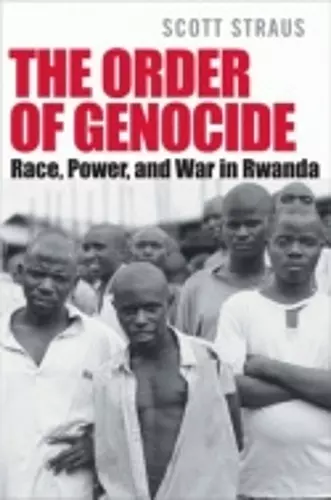The Order of Genocide
Race, Power, and War in Rwanda
Format:Hardback
Publisher:Cornell University Press
Published:14th Nov '06
Should be back in stock very soon

Winner of the Award for Excellence in Government and Political Science (AAP)
The Rwandan genocide has become a touchstone for debates about the causes of mass violence and the responsibilities of the international community. Yet a number of key questions about this tragedy remain unanswered: How did the violence spread from community to community and so rapidly engulf the nation? Why did individuals make decisions that led them to take up machetes against their neighbors? And what was the logic that drove the campaign of extermination?
According to Scott Straus, a social scientist and former journalist in East Africa for several years (who received a Pulitzer Prize nomination for his reporting for the Houston Chronicle), many of the widely held beliefs about the causes and course of genocide in Rwanda are incomplete. They focus largely on the actions of the ruling elite or the inaction of the international community. Considerably less is known about how and why elite decisions became widespread exterminatory violence.
Challenging the prevailing wisdom, Straus provides substantial new evidence about local patterns of violence, using original research—including the most comprehensive surveys yet undertaken among convicted perpetrators—to assess competing theories about the causes and dynamics of the genocide. Current interpretations stress three main causes for the genocide: ethnic identity, ideology, and mass-media indoctrination (in particular the influence of hate radio). Straus's research does not deny the importance of ethnicity, but he finds that it operated more as a background condition. Instead, Straus emphasizes fear and intra-ethnic intimidation as the primary drivers of the violence. A defensive civil war and the assassination of a president created a feeling of acute insecurity. Rwanda's unusually effective state was also central, as was the country's geography and population density, which limited the number of exit options for both victims and perpetrators.
In conclusion, Straus steps back from the particulars of the Rwandan genocide to offer a new, dynamic model for understanding other instances of genocide in recent history—the Holocaust, Armenia, Cambodia, the Balkans—and assessing the future likelihood of such events.
The Order of Genocide will be an enduring contribution to our understanding of the Rwandan genocide as well as to theories of ethnic violence and genocides more generally. Although his methods and findings will certainly interest scholars of genocides, violent conflicts, and African area studies, Straus does not obscure his work in specialist language.
* Nations and Nationalism *Scott Straus ranks among the finest of the scholars writing in genocide studies. The Order of Genocide is fair-minded, important, and rigorous. Drawing on more than two hundred interviews that he conducted with convicted Rwandan killers, and on many other sources, Straus builds a dynamic process model seeking to explain why and how ordinary people could be mobilized to murder their neighbors in the Rwandan genocide.
* African Studies Review *Straus examines the 1994 Rwandan genocide through a social science lens... and his approach yields interesting new insights.... Particularly compelling is his comparison of killers in Rwanda with those of the Holocaust.
* Foreign Affairs *Straus shows tenacity and courage in explaining the unthinkable—how otherwise ordinary people could imagine, conceive, and carry out genocide.
* Genocide Studies and Prevention *Straus's study is comprehensive, thorough, and cogently and carefully argued. It is altogether an impressive work that is compulsory for specialists and invaluable for students. Straus is a former journalist and his writing is a model of clarity and economy.
* Perspectives on Politics *Straus's writing is lucid, the structure of the book is well thought out, and jargon is avoided, making The Order of Genocide accessible to anyone interested in the subject. A must-read for those interested in politics and violence.
* Journal of Peace Resear- Winner of Winner of the Award for Excellence in Government and Political Science (Professional and Scholarly Publishing Division, Association of American Publishers) 2007 (United States)
- Winner of Mahatma M.K. Gandhi Fellow 2023 (United States)
- Commended for Honorable Mention, 2006 Melville J. Herskovits Award (African Studies Association) 2006 (United States)
ISBN: 9780801444487
Dimensions: 229mm x 152mm x 27mm
Weight: 907g
296 pages